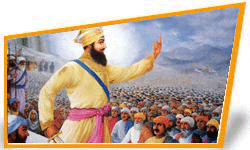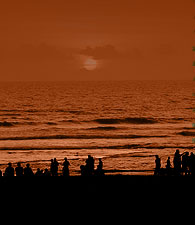History:

On this memorable Baisakhi day (March,30 of A.D.1699) , Guru Gobind Singh Sahib called a big meeting at Kesgarh Sahib near the City of Anandpur Sahib. Between fifty to eighty thousand Sikhs attended this meeting. When all were expecting to hear words of comfort and consolation from the lips of their Guru, they were perturbed to see him with a drawn sword in his hand and cried ' Is there anyone here who would lay down his life for Dharam?' There was a big silence, but the Guru went on repeating his demand. At the third call Daya Ram, a Khatri of Lahore, rose from his seat and offered himself. The Guru took him into an adjoining enclosure....(and soon after) came out with the blood) dripping....(sword in hand) and flourshing it before the gathering, asked again, 'Is there any other Sikh here who will offer himself as a sacrifice(for the cause of dharma)?
At this Daram Das, a Jat of Delhi (Haryana side) came forward and was taken into the enclosure....(The Guru again came out with the blood-stained sword, and made his previous demand). In the same way three other men stood up, one after another, and offered themselves for the sacrifice. One was Mohkam Chand, a washerman of Dwarka (Gujarat State); another was Himmat, a cook of Jagannath (Orissa State); and the third was Sahib Chand,
a barber of Bidar (Karnataka State). The Guru, after dressing the five in handsome clothes, brought them from the assembly.
These five were then administered 'Khande di Pahul' (the double-edged Sword Amrit). They were then knighted as Singhs, as the Five beloved ones, the first members of the Order of the Khalsa. The Guru then asked them to administer the Pahul to him in the same manner in which he had given the Pahul to them, and it was done so.
With the creation of Khalsa, the Khalsa created history and since the birth of Khalsa, the history of Punjab has been the history of Sikhs. Baisakhi played a significant role in this regard. In 1762, Ahmed Shah Abdali, with the sole purpose to destroy the entire Sikh nation, declared 'Jehad'(holy-war) against the Sikhs and all the Muslims of the Punjab rallied under this slogan. The Sikhs were surrounded near the village Kup in Ludhiana District. Chronicles mention that about twenty thousand Sikhs were martyred in a single day. This event is known in the history of the Sikhs as "Ghallughara" (Bloody Carnage). After this, Ahmed Shah Abdali thought that he had crushed the entire Sikh nation, but was greatly disillusioned when after a few months heard that the Sikhs in large number are celebrating Baisakhi at Amritsar. In due course of time Baisakhi reminds every Sikh of his cultural and religious heritage. On Baisakhi day all the Sikhs used to assemble at Amritsar and decide their
problems relating to politics and religion. This convention still goes on.
Celebrated on :
The auspicious day of Baisakhi is celebrated all over India though under different names and with different set of rituals. People of Assam celebrate April 13 as Rongali Bihu, while those in West Bengal celebrate it as Naba Barsha. Bihar celebrates Baisakhi as Vaishakha in honour of the Sun God, Surya while Kerala celebrates it as Vishu and Tamil Nadu as Puthandu. In Kashmir, a ceremonial bath and general festivity mark Baisakhi while in Himachal Pradesh devotees flock to the temple of Jwalamukhi and take a holy dip in the Hot Springs.
Legends :
>> Harvest Festival: -
Baisakhi Festival marks the time for the harvest of Rabi crops and is therefore celebrated with utmost joy and enthusiasm in the state of Punjab where agriculture is the predominant occupation of the people. To celebrate the occasion, people dress themselves gaily and perform the joyful bhangra and giddha dance on the tune of the dhol. Farmers in Punjab celebrate Baisakhi Festival to hilt by feasting and merrymaking before they hit on tiring but joyful task of harvesting from the next day. As a harvest
festival, Baisakhi is also celebrated by different names and with different rituals in several regions of India. Regional celebrations of Baisakhi are marked as Rongali Bihu in Assam, Naba Barsha in Bengal, Puthandu in Tamil Nadu, Vishu in Kerala and Vaishakha in Bihar.
>> Birth of Khalsa : -
The day of Baisakhi marks the birth of Khalsa Panth and therefore holds tremendous significance for the Sikhs. It was on the Baisakhi Day meeting organized at Anandpur Sahib, in 1699, that the tenth Guru of Sikhs, Guru Gobind Sigh laid the foundation of Khalsa Panth and called on the Sikhs to sacrifice themselves for their community. Besides, it was on the Baisakhi Day that Guru Gobind Singh administered amrit (nectar) to his first batch of five disciples, the Panj Piaras making them Singhs, a martial community.
After the Baisakhi Day in 1699 the tradition of gurus was discontinued, and the Granth Sahib - the Holy book of the Sikhs was declared the eternal guide of the Sikhs.
>> Day to Receive Guru’s Blessings for Sikhs :-
According to a popular legend in Sikhism, it was on the day of Baisakhi in 1567 that Guru Amar Das had first institutionalized Baisakhi as one of the special days when all Sikhs would gather to receive the guru's blessings at Goindwal.
>> Martyrdom of Guru Arjan Dev :-
Yet another legend related to Baisakhi, says that on the day of Baisakhi Guru Arjan Dev was martyred by the Muslim rulers. It is said that in an act of barbaric cruelty Muslim rulers threw the Guru alive into a cauldron of boiling oil.
>> Foundation of Arya Samaj : -
The day of Baisakhi Festival is also important for the Hindus as it on this day in 1875 that Swami Dayanand Saraswati founded the Arya Samaj - a reformed sect of Hindus who are devoted to the Vedas for spiritual guidance and have discarded idol worship.
>> Attainment of Nirvana by Gautam Buddha : -
For the Buddhist, the day of Baisakhi Festival is significant, as according to a popular legend it was on this auspicious day that Gautam Buddha attained enlightenment or Nirvana under the Mahabodhi tree in the town of Gaya. For this reason, the day of Baisakhi is celebrated as Buddha Purnima is several parts of the country.







